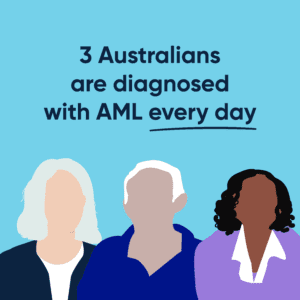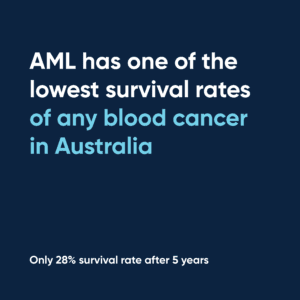Prof. Ravinda Majeti, Assoc. Professor Daniel Thomas: Personalized Metabolic Targeting of Epigenetic AML Mutations

Acute myeloid leukaemia (AML) is a devastating blood cancer that affects both young and elderly persons and for which treatment outcomes have not improved for more than 30 years even with standard high dose chemotherapy regimens.
Leukaemia cells have a block in their ability to mature into normal blood cells for reasons that are only partially understood, but derive in part from mutations acquired in these cells. We were among the first to discover stem cells from the bone marrow of AML patients that carried these mutations eventually leading to the outgrowth of leukaemia.
Intriguingly, many of these mutations alter stem cell maturation into functional blood cells, a process termed differentiation, by interfering with the mechanisms through which different genes are expressed, such as hydroxymethylation DNA modification and histone acetylation marks.
Our research has recently discovered a strong link between the metabolism of leukaemia cells and common leukaemia-causing mutations through modulation of a central metabolic factor termed alpha ketoglutarate.
This work has opened up a major new branch of research and opportunities to eradicate leukaemia by changing metabolic profiles. We find that some mutations in AML decrease alpha ketoglutarate effects on DNA and histones (TET2 mutations) while other mutations change the ability of alpha ketoglutarate to generate energy in the mitochondria of cells (CEBPA mutations).
Moreover, other mutations cause defects in shuttling alpha ketoglutarate to build new fatty acids to make cell membranes (IDH1 mutations).
All of these metabolic changes represent new vulnerabilities that can be exploited for novel therapeutic approaches.
We have developed innovative methods involving small numbers of leukaemia cells from patients that can assess the fate of alpha ketoglutarate-dependent reactions on DNA, histones, lipid production, and energy metabolism.
Here, we propose to apply to these methods to characterize a large number of AML patient samples to inform a precision medicine therapy approach. Furthermore, we propose to investigate pharmacologic agents targeting these alpha ketoglutarate-dependent reactions using patient samples in the lab and in animal models.
Our overall objective is to develop a personalized medicine approach through metabolic targeting to deliver mutation-directed therapies to AML patients.
This project is kindly supported by John and Maureen Wilson and through the Estate of Carmelita Herzenak
Last updated on January 30th, 2023
Developed by the Leukaemia Foundation in consultation with people living with a blood cancer, Leukaemia Foundation support staff, haematology nursing staff and/or Australian clinical haematologists. This content is provided for information purposes only and we urge you to always seek advice from a registered health care professional for diagnosis, treatment and answers to your medical questions, including the suitability of a particular therapy, service, product or treatment in your circumstances. The Leukaemia Foundation shall not bear any liability for any person relying on the materials contained on this website.
